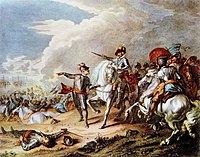
Photo from wikipedia
ABSTRACT Recent research on multi-actor civil wars highlights that rebel organizations condition their conflict behavior on that of other rebel organizations, with competition and free-riding constituting the core theoretical mechanisms.… Click to show full abstract
ABSTRACT Recent research on multi-actor civil wars highlights that rebel organizations condition their conflict behavior on that of other rebel organizations, with competition and free-riding constituting the core theoretical mechanisms. We provide a new actor-centric approach to explicitly model strategic interdependence in multi-actor civil wars. We argue that rebel organizations have incentives to remain mobilized until the end of a conflict to maintain their power to negotiate, power to spoil, power to enforce, and power to protect. This induces strategic complements that dominate duration dynamics in multi-actor conflicts. Based on a network game-theoretic model, we derive a spatial econometric framework that allows for a direct test of strategic interdependence. We find that the estimated duration interdependence is positive but partially offset in secessionist conflicts where the public goods nature of the incompatibility also induces strategic substitution effects.
Journal Title: International Interactions
Year Published: 2020
Link to full text (if available)
Share on Social Media: Sign Up to like & get
recommendations!